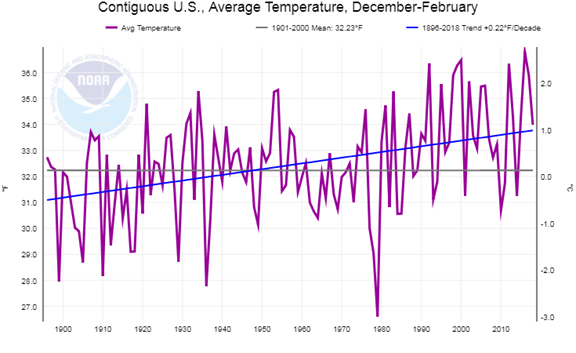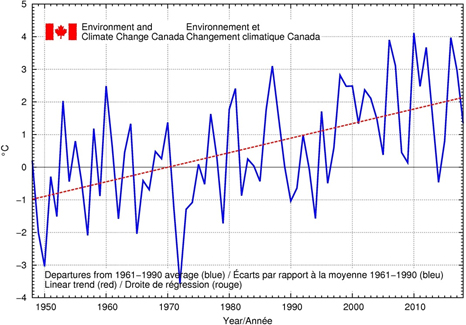Another failure to tackle fake news about climate change
Posted on 14 Jun 2018 in Commentary
The Independent Press Standards Organisation (IPSO) has today demonstrated again that it is unwilling to take action against fake news about climate change that appears in its member newspapers.
It is the latest example of the difference between IPSO’s actions and its advertising campaign, launched in April, which claims “IPSO regulated publications are committed to high standards and accurate reporting”.
In fact, its new ruling shows that newspapers are free to publish inaccurate and misleading information about climate change because IPSO treats facts as opinions.
In January, I complained to IPSO about an article by Christopher Booker, the veteran columnist for The Sunday Telegraph, which included several inaccurate and misleading statements about the trend in winter temperatures in North America.
Mr Booker stated in his column on 21 January that there had been a “recent series of unusually cold winters in North America”. He was responding to my letter to the newspaper, published on 14 January, which had pointed out that his claim, first published on 7 January, was demonstrably untrue.
Although there is no consolidated record for North America, the official set of measurements collated by the national meteorological organisations of the United States and Canada clearly show that North America has been experiencing a series of unusually warm winters – the opposite of Mr Booker’s bogus assertions.
For instance, figures published by the United States National Climatic Data Center of the National Oceanic and Atmospheric Administration (NOAA) show that from 1990–91 the contiguous United States (i.e. not including Alaska and Hawaii) has had 23 winters that were warmer than the average for the 20th century, including the 10 warmest winters since records began in 1895–96 (see Figure 1). During that period, there were only six winters that were slightly colder than the average for the 20th century, none of which was ranked among the 20 coldest.
Figure 1: Average winter temperature in the contiguous United States

Similarly, the records maintained by the Canadian Government show that 24 of the winters from 1990–91 onwards have been warmer than the average for the period 1961–1990 (national records for Canada start in 1948), including eight of the 10 warmest (see Figure 2).
Figure 2: Average winter temperature in Canada
For both the United States and Canada, a clear trend towards warmer winters can be detected from the meteorological records. But this is a fact that Mr Booker seemed determined to hide from the newspaper’s readers.
Mr Booker grudgingly acknowledged that the official meteorological records for the United States show that seven of the 10 past winters have been warmer than average. But he also claimed: “in a way which has aroused widespread suspicion, NOAA’s figures have lately been significantly ‘adjusted’, to suggest that several famously severe recent winters, such as those in 2008 and 2014, were not unusually cold by the standards of the 20th century”.
Mr Booker added that “this is only the latest in a whole series of similarly suspect adjustments made to official US temperature figures in recent years, which I have described as one of the greatest scientific scandals of all time.”
Mr Booker provided no evidence to support this astonishing allegation that the national meteorological organisation of the United States is conspiring to misrepresent the trend in winter temperatures, instead just citing the website of a retired accountant, Paul Homewood.
During the investigation of my complaint, the newspaper’s justification for the publication of Mr Booker’s falsehoods fell apart. While claiming to be “a paper of record”, it bizarrely refused to accept that the winter in North America should be defined in line with meteorological conventions as the three-month period between December and February, and indeed would not accept that North America consists of Canada, the United States and Mexico. Instead, the newspaper pointed to media reports of episodes of very cold winter weather that had occurred in parts of eastern United States and Canada as proof of the “recent series of unusually cold winters in North America”. It rejected the evidence that these reports were not representative of the overall temperature records for winters in North America, which show a very clear warming trend.
The newspaper also pointed to Mr Homewood’s website, which draws attention to the fact that NOAA corrects the records of weather stations across the United States during the process of calculating climate trends. These corrections are necessary because many stations have replaced their instruments or changed their methods over time, which can mean that the raw measurements cannot be compared. For instance, some weather stations have changed the time of day at which they record the temperature, which has introduced a systematic bias when trying to compare measurements from the early 20th century against more recent ones.
All of these corrections have been independently scrutinised and documented in scientific papers over the years. For instance, Matthew Menne and co-authors published a paper in the journal Bulletin of the American Meteorological Society in July 2009 which discussed why these corrections were necessary and how they have affected the overall record.
It is clearly ridiculous that Mr Booker should claim that these corrections constitute “one of the greatest scientific scandals of all time”.
So with Mr Booker’s claims being so manifestly untrue, why did IPSO decide that there had been no breach of the Editors’ Code of Practice, Clause 1 of which states: “The Press must take care not to publish inaccurate, misleading or distorted information or images, including headlines not supported by the text”?
The answer lies in IPSO’s weird interpretation of the Code as it applies to climate change, where it consistently treats all information as just a matter of opinion. In this case, newspapers are permitted by IPSO to publish as much demonstrably inaccurate and misleading information as they like, as long as it is labelled as ‘opinion’.
IPSO’s decision about Mr Booker’s column makes this clear. It states: “Clause 1 does not prevent a newspaper from publishing controversial opinions on topics which continue to be divisive, such as the existence or impact of climate change.”
According to IPSO, Mr Booker was entitled to tell readers of The Sunday Telegraph that North America has experienced a series of unusually cold winters, when the meteorological data show the opposite to be true. The newspaper was even allowed to redefine the North American winter as a few days of cold weather in a few places. And it was allowed to suggest, without any evidence whatsoever, that NOAA was guilty of “one of the greatest scientific scandals of all time”.
IPSO also told me that it does not need to consult scientists or any other experts before deciding on complaints about the misreporting of climate change.
IPSO’s consistent failure to act against fake news about climate change has many consequences. It confirms that the UK’s system of self-regulation for newspapers remains hopelessly broken. It is not surprising that many newspapers, including The Guardian, The Independent and the Financial Times, have refused to join IPSO.
IPSO’s failure also helps to undermine the public’s confidence in the integrity of journalists. A recent opinion poll shows that only 27 per cent of the public trust journalists to tell the truth, placing them just ahead of professional footballers and politicians. In contrast, 83 per cent of the public trust scientists to tell the truth.
Most importantly of all, IPSO’s actions are allowing newspapers to harm the public interest and putting people at greater risk from the impacts of climate change. It is the systematic misreporting by newspapers like The Sunday Telegraph that is contributing to public confusion about climate change. A recent survey, for instance, found that only 30 per cent of the UK public realise that the vast majority (80% or more) of scientists agree. And the Committee on Climate Change has highlighted that people may not be taking steps to protect themselves against the deadly effects of heatwaves because most of the public wrongly believe that the incidence of hot weather in the UK is declining.
But IPSO’s ruling will delight Mr Booker and his fellow campaigners at the Global Warming Policy Foundation, which was set up by Lord Lawson to lobby against policies to reduce greenhouse gas emissions from the burning of fossil fuels.
In February, the Foundation published an error-strewn leaflet by Mr Booker which accused climate scientists of “groupthink”. Mr Booker neglected to mention that the Foundation has been sanctioned by the Charity Commission because it only promotes climate change denial.
Mr Booker will no doubt continue to use The Sunday Telegraph to spread fake news about climate change, with the blessing of the newspaper’s editor, Allister Heath, and of the hopeless IPSO.
Bob Ward is policy and communications director at the Grantham Research Institute on Climate Change and the Environment and the ESRC Centre for Climate Change Economics and Policy at the London School of Economics and Political Science.



